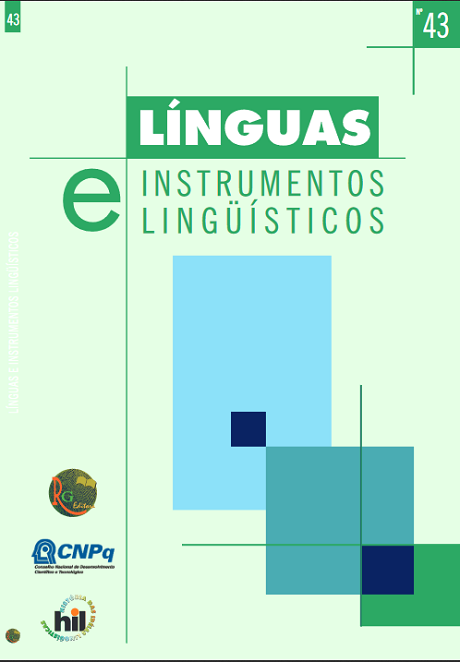Abstract
This work presents the data of an experience with the teaching of Portuguese language in the Education of Young and Adults in public schools. The main objective is to show the teaching-learning conditions in which students are inserted, so that one can think of strategies to modify their situation. Another objective is to identify the causes of these students' lack of interest in the activities developed in the schools. The method employed is an empirical nature and consists in the observation not only of classes taught by trainees, but also of the behavior of students during the classes. The results show that in these classes, outdated methods of teaching are still employed, including normative grammar from invented sentences, in which the terms of the clause, such as subject, predicate and object are mainly analyzed.
References
ARCE, A. (2008). O Mobral e a educação de crianças menores de seis anos durante o regime militar: em defesa do trabalho voluntário. Cad. Cedes, Campinas, vol. 28, n. 76, p. 379-403, set./dez.
BAGNO, M. (2007). Nada na língua é por acaso: por uma pedagogia da variação linguística. São Paulo: Parábola Editorial.
BAKHTIN, M. M. (1992). Os gêneros do discurso. In: Estética da criação verbal. São Paulo: Martins Fontes.
BARREYRO, G. B. (2010). O "Programa Alfabetização Solidária": terceirização no contexto da reforma do Estado Educ. ver. Nº 38, Curitiba, set./dez. Disponível em: http://dx.doi.org/10.1590/S0104- 40602010000300012. Acesso em 10 de junho de 2018.
BENTES, A. C. Gênero e ensino: algumas reflexões sobre a produção de materiais didáticos para a educação de jovens e adultos. In. KARWOSKI, A. M.; GAYDECZKA, B.; BRITO, K. S. (Orgs.) (2008). Gêneros textuais: reflexões e ensino. Rio de Janeiro: Nova Fronteira.
BEZERRA, M. A.; REINALDO, M. A. Análise linguística: afinal a que se refere? São Paulo: Cortez, 2013.
BORTONI-RICARDO, S. M. (2004). Educação em língua materna: a Sociolinguística na sala de aula. São Paulo: Parábola Editorial.
BRASIL. Ministério da Educação. (2002). Proposta Curricular para a educação de jovens e adultos: segundo segmento do ensino fundamental, 5a a 8a série. Brasília: Secretaria de Educação Fundamental.
BRASIL. Senado Federal. (2005). Lei de Diretrizes e Bases da Educação Nacional. Brasília: Secretaria Especial de Editoração e Publicações. Subsecretaria de Edições Técnicas.
BRASIL. Ministério da Educação. (2006). Trabalhando com a educação de jovens e adultos: alunas e alunos da EJA. Brasília: Departamento de Educação de Jovens e Adultos.
BYBEE, J. Language, usage and cognition. (2010). Cambridge: Cambridge University Press.
CASTILHO, A. T. de. (1998). A língua falada no ensino de português. São Paulo: Contexto.
COELHO, I. L. et ali. (2015). Para conhecer sociolinguística. São Paulo: Contexto.
FREIRE, P. (2015). Pedagogia da autonomia: saberes necessários à prática educativa. Rio de Janeiro: Paz e Terra, 51ª Ed.
GIVÓN, T. (1995). Functionalism and Grammar. John Benjamins Amsterdam/Philadelphia.
LAKOFF, G. (1987). Women, Fire and Dangerous Things. What categories reveal about the mind. Chicago: University of Chicago Press.
LAKOFF, G. The contemporary theory of metaphor. In: ORTONY, A. (1993). Metaphor and thought. Cambridge University Press, pp. 202-251.
LAKOFF, G.; JOHNSON, M. (1980). Metaphors we live by. Chicago: University of Chicago Press.
MOLLICA, M. C.; BRAGA, M. L. (Orgs.). (2004). Introdução à Sociolinguística: o tratamento da variação. São Paulo: Contexto.
MONTEIRO. J. L. (2000). Para compreender Labov. Petrópolis: Vozes.
PEREIRA, M. T. G. (2013). O Ensino da Língua Portuguesa na Educação de Jovens e Adultos (EJA). Anais do SILEL. Volume 3, Número 1. Uberlândia: EDUFU. Disponível em: http://www.ileel.ufu.br/anaisdosilel/. Acesso em 26 de setembro de 2018.
RIBEIRO, V. M. M. (2001). Educação para jovens e adultos: ensino fundamental: proposta curricular - 1º segmento. São Paulo: Ação Educativa.
SANTOS, L. W.; RICHE, R. C.; TEIXEIRA, C. S. Análise e produção de textos. São Paulo: Contexto, 2013.
STRELHOW, T. B. (2010). Breve história sobre a educação de jovens e adultos no Brasil. Revista HISTEDBR On-line, Caminas, n.38, p. 49-59. Disponível em: www.histedbr.fe.unicamp.br/revista/edicoes/38/art05_38.pdf. Acesso em 10 de junho de 2018.
TRAVAGLIA, L. C. (2001). Gramática e interação: uma proposta para o ensino de gramática no 1º e 2º graus. São Paulo, Cortez, 7ª Ed.
https://creativecommons.org/licenses/by-nc-sa/4.0/
Línguas e Instrumentos Linguísticos has a Creative Commons (CC license, preserving the integrity of the articles in an open access environment – to copy and reproduce the material in any means or format; adapt – remix; transform and build over the material. The journal remain with the rights to publish without restrictions.

